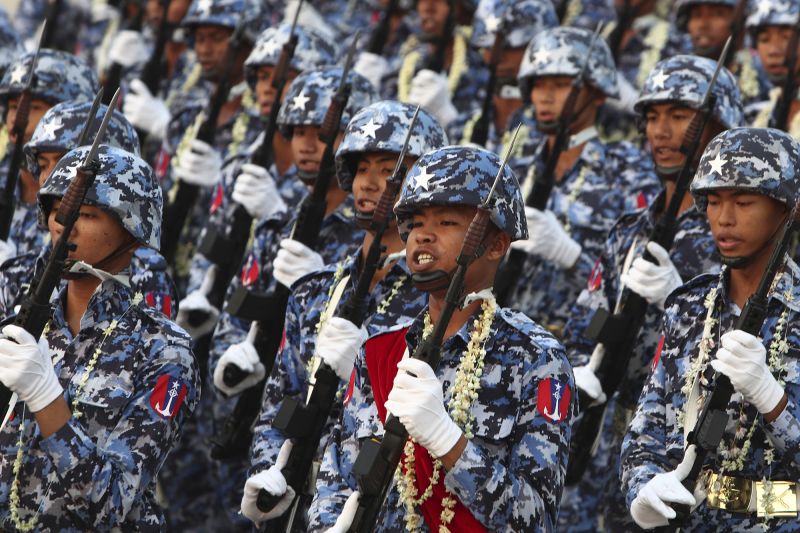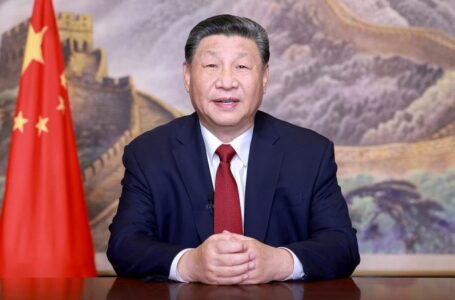‘I don’t want to kill’: Conscription law sparks fear in war-torn Myanmar


Anna wakes up about four times a night from dreams in which she is being sent to the front lines of a bloody war and forced to fight.
It’s a terrifying prospect that could become a reality for Anna and millions of her peers across Myanmar after the military junta activated a mandatory conscription law for all young men and women.
“We are in panic mode and are considering a way to escape,” said Anna, an educator in her 20s from the country’s south who requested to use a pseudonym to protect her safety. “I don’t think I can keep living in Myanmar.”
Three years on from its bloody coup, Myanmar’s military junta is facing the biggest challenge to its fragile hold on power as it struggles to fight a nationwide armed resistance on multiple fronts across the Southeast Asian nation.
The junta’s surprise announcement that it’s seeking to boost its armed forces with compulsory service prompted a rush by young people to get visas out of the country.
Videos shared on social media show long queues of people clutching documents at the Thai Embassy in Myanmar’s biggest city Yangon.
Under the law, all men ages 18 to 35 and women ages 18 to 27 are required to serve for up to two years under military command. Specialists such as doctors up to age 45 must serve for three years.
Evading conscription is punishable by three to five years in prison and a fine.
Analysts say the law, which has been on the books since the previous military regime in 2010 but not enacted until now, will force a young generation to fight their own people and could be used to justify human rights abuses. It could also result in further regional instability by sparking a mass exodus of people fleeing conscription into neighboring countries, they said.
Some say conscription is a desperate effort by the military to boost ranks depleted by death, desertions and defections.
“While wounded and increasingly desperate, the Myanmar military junta remains extremely dangerous,” Tom Andrews, United Nations Special Rapporteur for human rights in Myanmar, said in a statement. “Troop losses and recruitment challenges have become existential threats for the junta, which faces vigorous attacks on frontlines all across the country. As the junta forces young men and women into the military ranks, it has doubled down on its attacks on civilians using stockpiles of powerful weapons.”
‘We don’t have another choice’
Myanmar’s military has been weakened by unprecedented coordination between ethnic armed organizations and resistance groups known as People’s Defense Forces, analysts say.
These groups, which support the National Unity Government in exile, and ethnic rebel armies have taken control of hundreds of strategic border towns, key military positions and vital trade routes since launching an offensive last October.
Analysis from the United States Insitute of Peace suggests the military only has about 150,000 personnel, including 70,000 combat soldiers — “barely able to sustain itself as a fighting force” — and has lost at least 30,000 soldiers since the coup.
Defense Minister Adm. Tin Aung San said the military has capacity to recruit up to 50,000 people a year and conscripts “will receive salary, rations, and entitlements according to their grades and qualifications,” according to the state mouthpiece Global New Light of Myanmar.
People who have been temporarily exempted from serving in the military — those with a medical reason, civil servants, students and carers — must return to serve even if over the age of military service, Ting Aung San said, according to the paper. Veterans could also be called up, the Global New Light reported.
Junta spokesperson Zaw Min Tun said about 13 million young people would be eligible for conscription, with 60,000 men the first to be recruited reportedly beginning in April.
There’s little detail about how they’d be called up – and what training they’d receive to fight.
“People know for sure that no matter what is written in the conscription law, they will have to go to the front lines. That is one thing that every person in the country is sure of,” said Kyaw Naing, 28, a teacher from Yangon region who requested to use a pseudonym for his security.
Aung Myo Min, human rights minister for the shadow government in exile said it has received reports of mass defections to People’s Defense Forces, with some soldiers abandoning the military because “they don’t have enough food and they are forced to take up a position to fight against civilians.”
Some of those former soldiers told the National Unity Government the military’s power has weakened, and it desperately needs recruits, according to Aung Myo Min.
But both Anna and Kyaw Naing say they’ll refuse to join their ranks.
Anna said she doesn’t have the money or connections to buy a visa out of the country, and worries the junta will be monitoring the airports, stopping those of age and arresting them.
Her parents have urged her to escape as soon as possible, but that means finding a way to cross the border illegally to Thailand.
“All the information on Facebook right now is about how to escape this country,” Anna said.
“From my side, I will try and do as much as possible to escape but if not, I will join (the People’s Defense Forces),” Anna said. “It seems like we don’t have another choice.”
Neighboring Thailand would likely be the country of choice for many of those deciding to flee.
While Thailand has hosted Myanmar nationals fleeing conflict for decades in displacement camps along the border, it has not ratified the 1951 Refugee Convention and considers those fleeing persecution to be illegal immigrants, who face jail and potential deportation.
Reports of kidnappings and arrests
For Kyaw Naing, fleeing to Thailand is not an option as he is the sole breadwinner of his family and cares for his elderly parents.
“If I leave, no one is there to look after them. I just have to survive,” he said.
Kyaw Naing says he’s stopped going out at night for fear he’ll be arrested and sent to the barracks.
“My parents are afraid I might be kidnapped by police and soldiers when I’m on my way back home from work, or when I go outside to hang out with my friends, or even when I go out to throw litter into the dustbin in the street,” Kyaw Naing said.
Even before the announcement of the mandatory conscription law, local media has reported an increase in the arrests of young people in several towns and cities and military vehicles picking people up in the street. There are also reports of dozens of young people detained at airports in western Rakhine state in recent days, with no official explanation.
Khin Ohmar, founder and chairperson of Progressive Voices, a Myanmar human rights research and advocacy organization, said the conscription law will “provide the junta legal cover for abusive forced recruitment practices — grabbing young men and women, especially the disenfranchised and impoverished including minors, from bus stops and factories in the cities.”
Maung Nyein, 32, lives and works in Yangon, and worries how his wife and 8-year-old daughter will cope if he’s forced to serve.
“In Myanmar, young people are not safe anymore,” said Maung Nyein, who also requested to use a pseudonym for safety reasons. “If you are forced to enter the military, there are so many things to worry about.”
The prospect of being forced to fight and kill his compatriots terrifies him.
“In other countries, this law is to train you in case of another country’s invasion, but here there is civil war going on. This is to force you to kill each other.”
The junta’s ministry of Immigration and Population said in a statement that there is “no restriction on overseas leave” and international airports and the entry and exit points with neighboring countries “are operating as usual,” according to Global New Light.
The junta also denied that its “security forces and administrative organizations are conscripting youths for military training and arresting passers-by,” calling it “misinformation” spread by “malicious media networks.”
Forced labor already happening
Myanmar’s military has a long and documented history of using civilians as human shields or forcibly recruiting them to work in the army, either as porters – carrying military equipment to and from the front lines — or performing the risky task of clearing land mines from fields.
A major concern is that the law will be used by the military to legalize this practice.
A report from the International Labour Organization’s commission of inquiry from October 2023 found that since the coup, the Myanmar military junta “continues to exact different types of forced labor in the context of armed conflict … as well as forced recruitment into the army.”
Wing Ko, a farmer from Shwebo in central Sagaing region, said he was forcibly recruited to work for the military for three months in 2023.
He says he was one of 42 men, most over the age of 50 with the youngest just 16, who were forcibly taken by junta troops from their villages.
“If we knew the areas, we were forced to walk in front of them so that they don’t risk themselves (standing on) land mines.”
“I never thought I would see my family again. When I got home, I felt like I came back from being dead,” he said.
Maung Aye, also from Sagaing region, said six people from his village were taken by the military in June last year and forced to carry clothes and weapons.
He said there’s no way his neighbors would willingly join them.
“Our villagers won’t join the military forces or leave the country, instead we will join our resistance forces. I won’t let my children be taken by the military, instead I’d rather risk them joining the (People’s Defense Forces) for the revolution’s sake,” said Maung Aye, who also used a pseudonym for safety.
Impact on millions of young people
Conscription is not just about boosting troop numbers, analysts and human rights workers say, but a means to break up the powerful democratic resistance movement that has only gained in strength since the coup.
“The junta’s decision to enforce the conscription law now is also a way to remove the young people who were spearheading the Spring Revolution from the civilian population and put them in positions where they are likely to be killed or to kill their fellow people,” said Khin Ohmar.
The law would allow corruption, extortion and crime to flourish and could exacerbate a brain drain that’s already seen many young people leave Myanmar, impacting education and the labor market, which would “cause utter devastation to the country,” she said.
Those too young to be conscripted are already feeling the weight of the law.
“Today one of my teens asked me if all the lessons she is learning right now in class are still useful for her life in the future if she has to go to the front line,” Kyaw Naing said of his student.
“I was deeply saddened by that.”
Kyaw Naing says he’d join the resistance if faced with conscription. But he would offer to teach over holding a gun.
“I don’t want to kill people,” he said. “But if the situation pushes me to do it, I will have to. I won’t have a choice.”











